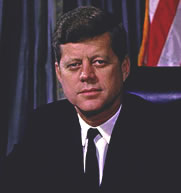The Schiller Institute Presents
A Remembrance of John F. Kennedy And a
Recommitment to the Principles of His Presidency
Featuring a Performance of:
W.A. MOZART REQUIEM
November 22, 2013
 |
Concert Video
Flyer for the concert
Poster for the concert
Oct. 20--The Schiller Institute announced today that it will present "A Remembrance of President John F. Kennedy and Recommitment to the Principles of His Presidency, Featuring a Performance of W.A. Mozart's Requiem in D minor, K. 626" on Friday, November 22, 8:00 p.m., at St. Mark Catholic Church in Vienna, Virginia.
The concert will be performed by the Schiller Institute Chorus along with an orchestra and soloists assembled for the occasion by the Schiller Institute. The performance will be at the natural Verdi tuning of A=432 Hz, in keeping with the Schiller Institute's decades-long campaign to return to the tuning which has been demonstrated to maximize the beauty of the singing voice and of fine musical instruments.
Admission is free: first come, first seated. More information can be obtained at: requiemconcert@schillerinstitute.org, or (703) 771-8390. For directions to St. Mark Catholic Church, see http://www.stmark.org/directions/.
In its flyer for the concert, the Schiller Institute elaborates on why it is holding this event at this time.
 |
"From the past, man obtains the insights, wisdom and hope to face with confidence the uncertainties of the future."
--President John F. Kennedy's remarks to the centennial of President Abraham Lincoln's Gettysburg address, November 19, 1963--three days before his death
November 22, 2013, will mark the 50th anniversary of the assassination of President John F. Kennedy. It is fitting on that solemn occasion to commemorate the spirit of cultural and economic progress with which Kennedy confronted, and sought to overcome, the terrifying prospects of global war, poverty, and human degradation that faced our nation and the world during his time. In the intervening years, these existential problems have come to threaten mankind in even greater magnitude, yet our national spirit of progress has been replaced with cultural pessimism and indifference. The great economic, scientific, and cultural projects begun then have long ago been dismantled, and their memory buried and all but forgotten. The national mind that joyfully embraced the challenge to conquer the Moon has been supplanted by a spirit that belittles the power of human creativity and accepts the inevitability of economic decline.
Therefore, to properly honor the memory of John Kennedy, not only must we reflect on what was, and what could have been, but on how our culture has changed, so that we can recommit ourselves to its revival. The spark of optimism which marked the Kennedy era, though dimmed, is still present among us, because it is embedded in the very fabric of our nation from its founding, having its roots in the great Renaissance thinker Nicholas of Cusa, in such works as his Concordantia Catholica and De Docta Ignorantia.
Wolfgang Amadeus Mozart's Requiem is a most fitting tribute to Kennedy. It expresses Mozart's passion for the concept of Man which he saw, in his time, as forming the basis for the establishment of the American republic, that Kennedy would come to promote and defend, and because the young genius Mozart pitted his creations directly against the same regressive social forces which arranged the assassinations of the President, his brother, and Martin Luther King.
An honest performance of Mozart's work communicates the same optimism and belief in man's infinite progress to which Kennedy, following in Franklin Roosevelt's footsteps, dedicated his life, in resolute opposition to those who wish to drastically reduce the world's population through perpetual warfare and denial of basic needs, and in affirmation of that which distinguishes him uniquely from the beasts, namely his creative capacity to discover new, yet-unthought universal principles.
* * *
The Schiller Institute was founded in 1984 on the initiative of Helga Zepp-LaRouche, wife of the American statesman and physical economist Lyndon LaRouche, for the purpose of reviving the paradigm of Classical culture and reasserting the right of all humanity to material, moral, and intellectual progress. It is named after Friedrich Schiller, the Poet of Freedom whose Ode to Joy is immortalized by Beethoven in his Ninth Symphony. The institute has sponsored many international conferences devoted to promoting the idea that a dialogue among cultures can only be fruitful when it focuses on each culture's noblest expression.
For more about the Schiller Institute and its activities, see http://www.schillerinstitute.org and also http://newparadigm.schillerinstitute.com.
